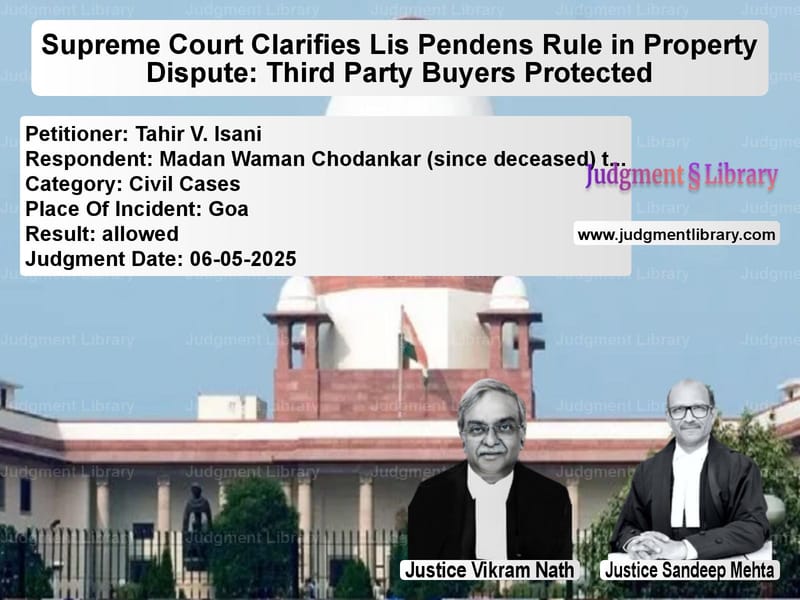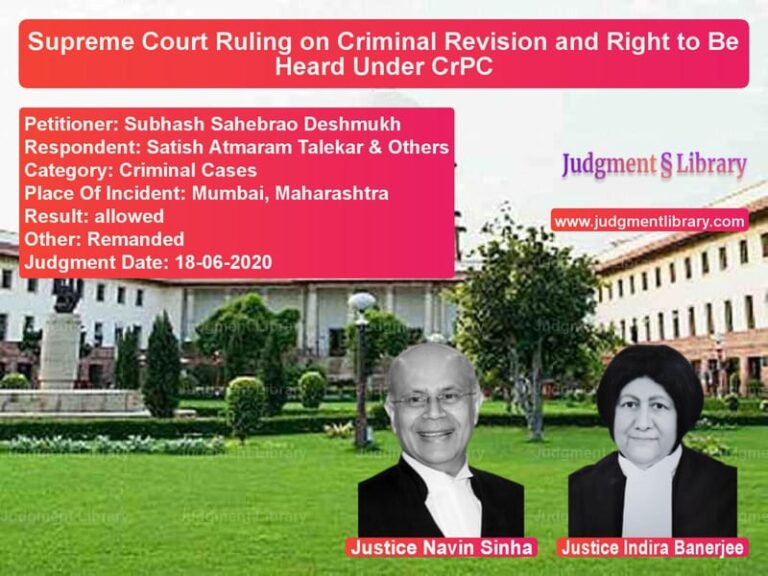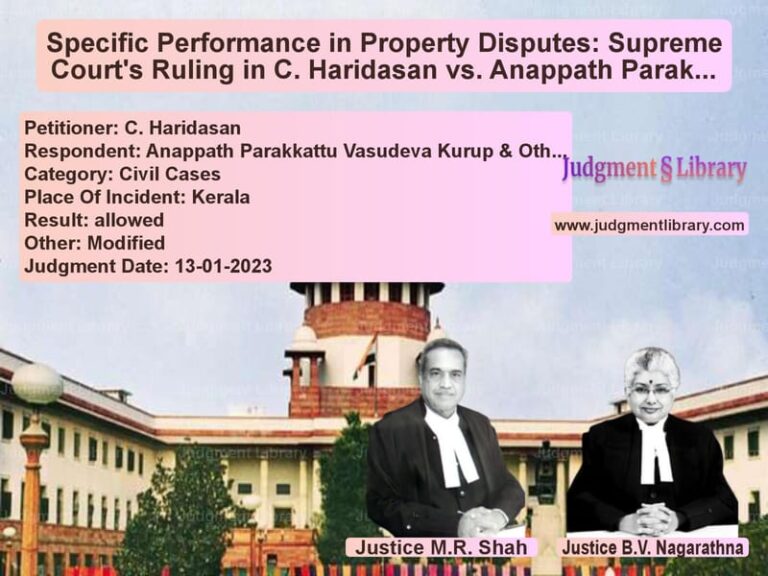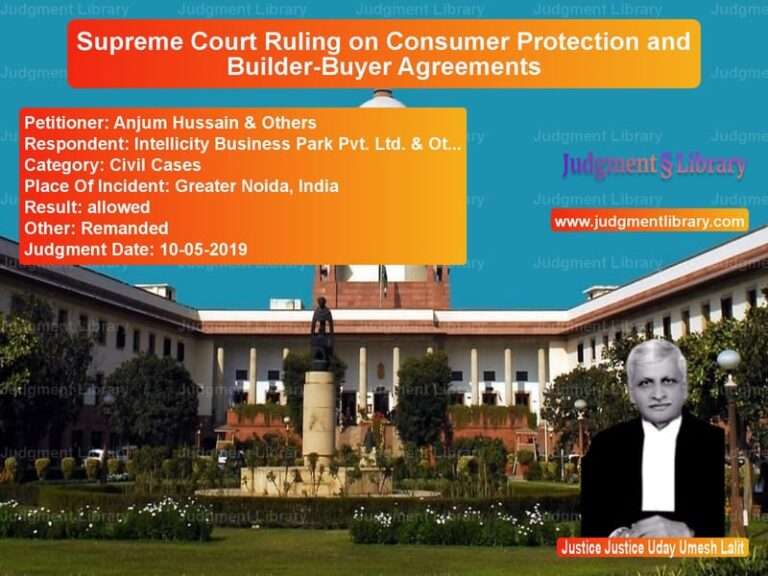Supreme Court Clarifies Lis Pendens Rule in Property Dispute: Third Party Buyers Protected
In a landmark judgment that brings clarity to property disputes involving third-party purchasers, the Supreme Court of India delivered a significant ruling on May 6, 2025, setting aside the Bombay High Court’s order and allowing an execution proceeding to continue. The case of Tahir V. Isani versus Madan Waman Chodankar (since deceased) through his legal representatives revolved around the complex interplay between property rights, execution proceedings, and the doctrine of lis pendens under Order XXI of the Code of Civil Procedure.
The dispute has its roots in a property located in Panaji, Goa, originally owned by Mrs. Maria Eduardo Apolina Gonsalves Misquita. The property consisted of a plot measuring 477 square meters with a two-floor building. A portion of this property on the ground floor, measuring 123 square meters, was leased to Madan Waman Chodankar (respondent no.1) through a deed dated February 22, 1977. This seemingly straightforward lease arrangement would eventually spiral into a legal battle spanning decades.
The complexity began when respondent no.1 entered into a partnership on March 13, 1977, with Dyaneshwar Keshav Malik and others (‘Maliks’) for setting up a hardware business. The business was to operate from a portion of the leased premises, though the tenancy continued to remain with respondent no.1. The original owner, Mrs. Misquita, sold the entire property to M/s. Rizvi Estate and Hotels Pvt. Ltd. through a registered sale deed dated January 16, 1988.
A crucial development occurred on April 16, 1988, when an agreement was executed between the purchaser, M/s. Rizvi Estate and Hotels Pvt. Ltd., and the Maliks (sub-lessee) for surrendering possession to enable the purchaser to demolish the building and construct a new multi-storied building. The agreement stipulated that after construction, space would be provided to the sub-lessee in the new building, with alternate space being provided in the meantime. Respondent no.1 was a confirming party in this document.
The legal battles began in earnest when respondent no.1 filed Regular Civil Suit No.112/88/C for injunction against M/s. Rizvi Estate and Hotels Pvt. Ltd. to prevent them from demolishing portions of the building. Simultaneously, in 1989, M/s. Rizvi Estate and Hotels Pvt. Ltd. filed an application for eviction of respondent no.1 before the Rent Controller (Rent Case No.17 of 1989), alleging that the sub-letting to Maliks violated the original lease deed.
In 1996, respondent no.1 filed Special Civil Suit No.97/1996/B against Maliks for dissolution of partnership, recovery of profit, and ejectment. The Maliks, in their written statement, stated that all parties had surrendered their rights in favor of M/s. Rizvi Estate and Hotels Pvt. Ltd. on April 11, 1988. Meanwhile, the Civil Judge, through judgment dated July 22, 1999, decreed the injunction suit filed by respondent no.1 and restrained M/s. Rizvi Estate and Hotels Pvt. Ltd. from demolishing the building. This decision was upheld in appeal on December 24, 2001.
A significant turning point came when M/s. Rizvi Estate and Hotels Pvt. Ltd. sold the property to the appellant, Tahir V. Isani, through a registered sale deed dated April 24, 2007. Subsequently, the Maliks executed a surrender deed on October 5, 2007, in favor of the appellant after accepting Rs.10 lakhs. Meanwhile, the Trial Court decreed Special Civil Suit No.97/1996/B in favor of respondent no.1 through an ex parte judgment dated April 24, 2008, as the Maliks did not contest the suit further.
Respondent no.1 then filed an execution application for the decree dated April 24, 2008, which was registered as Execution Application No.22 of 2008 (B). In February 2009, the appellant moved an application under Order XXI Rules 97 and 101 of CPC objecting to the execution of the decree. The appellant applied for framing of issues on August 18, 2011, and the Executing Court framed issues on September 5, 2013, dealing with Section 52 of the Transfer of Property Act and noting that the sale deed dated April 24, 2007, was prior to the decree and that tenancy rights had been surrendered through a written agreement dated April 11, 1988.
Evidence recording in the proceedings under Order XXI Rules 97 and 101 of CPC continued, with the appellant’s statement being recorded around 2019. At this stage, after ten years, the legal heirs of respondent no.1 (who had since died) moved an application to discontinue the enquiry based on the doctrine of lis pendens. The Executing Court dismissed this application on September 17, 2021. Aggrieved, the decree-holder preferred Writ Petition No.86 of 2022, which was allowed by the High Court through the impugned order dated July 25, 2022, leading to the present appeal before the Supreme Court.
The Supreme Court began its analysis by examining the findings of both the Executing Court and the High Court. The Executing Court had recorded several crucial reasons for rejecting the application to discontinue the enquiry. “The suit in question i.e. 97/1996/B was only for dissolution of partnership and recovery of profits and ejectment. It did not deal with the title to the property in question.” The Court further noted that “There was no issue relating to ownership of the said property as admittedly respondent no.1 had claimed to be a tenant under a lease deed dated 22nd February, 1977 and subsequently, having sub-let the same had formed a partnership with Maliks.”
Most importantly, the Executing Court had observed that “The appellant had purchased the property not from any party to the said suit, i.e. the plaintiff or the defendant, but from the owner M/s. Rizvi Estate and Hotels Pvt. Ltd., who was not a party to the proceedings in which decree was granted in favour of respondent no. 1.” Consequently, “The appellant being the owner of the property in question had a right to raise objection under Order XXI Rules 97 and 101 of CPC and the Executing Court was bound to enquire into and thus, adjudicate upon the said objection.”
The High Court, however, took a different view, holding that “since the appellant was a transferee pendente lite of judgment debtor, therefore, in view of provisions of Rule 102 of Order XXI of CPC, the application filed by the appellant under Rules 97 and 101 of Order XXI CPC was not maintainable.”
The Supreme Court delved deep into the legal framework, examining Order XXI Rules 97 to 102 of the CPC. The Court explained that “The whole scheme of Rule 102 of Order XXI intends to preserve the idea of achieving finality of the judicial decisions. The provision imbibes the principle of ‘interest reipublicae ut sit finis litium’ i.e., it is in the interest of the State that there should be an end to litigation.”
The Court extensively referred to its earlier decision in Usha Sinha v. Dina Ram and others, where it was held that “Rule 102 clarifies that Rules 98 and 100 of Order 21 of the Code do not apply to transferee pendente lite… Bare reading of the Rule makes it clear that it is based on justice, equity and good conscience. A transferee from a judgment-debtor is presumed to be aware of the proceedings before a court of law. He should be careful before he purchases the property which is the subject-matter of litigation.”
The Court emphasized the rationale behind Rule 102, noting that “If unfair, inequitable or undeserved protection is afforded to a transferee pendente lite, a decree-holder will never be able to realise the fruits of his decree. Every time the decree-holder seeks a direction from a court to execute the decree, the judgment-debtor or his transferee will transfer the property and the new transferee will offer resistance or cause obstruction. To avoid such a situation, the Rule has been enacted.”
The Court also referenced the recent case of Jini Dhanrajgir and another v. Shibu Mathew and another, where it noted the plight of decree-holders in India. The Court quoted the Privy Council’s observation from 1872 that “the difficulties of litigants in India indeed begin when they have obtained a decree” and lamented that “Notwithstanding the enormous lapse of time, we are left awestruck at the observation of the Privy Council which seems to have proved prophetic. The observation still holds true in present times and this case is no different from cases of decree-holders’ woes commencing while they are in pursuit of enforcing valid and binding decrees passed by civil courts of competent jurisdiction.”
The Court outlined the essential ingredients for applying Rule 102: “For a case to fall under Rule 102, it is condition precedent that there exists a decree for the possession of immovable property. Secondly, there must be a resistance or an obstruction in the execution of the said decree. Thirdly, such obstruction or resistance must be made by a person to whom the judgment-debtor has transferred the property. Fourthly, such transfer must have occurred after the institution of the original suit, i.e. the one in which the decree was passed.”
The Court further elaborated on the doctrine of lis pendens, quoting from the English case Bellamy v. Sabine: “where a litigation is pending between a plaintiff and a defendant as to the right to a particular estate, the necessities of mankind require that the decision of the court in the suit shall be binding not only on the litigating parties, but also on those who derive title under them by alienations made pending the suit, whether such alienees had or had not notice of the pending proceedings. If this were not so, there could be no certainty that the litigation would ever come to an end.”
However, the Court made a crucial distinction that became the cornerstone of its judgment: “Rule 102 of Order XXI applies only to a person to whom the judgment-debtor has transferred the immovable property which was subject matter of that suit pendente lite. If the person who is resisting or obstructing the execution of the decree for possession of such property, is not the transferee of judgment-debtor, i.e. he does not trace his title from judgment-debtor, bar of Rule 102 does not apply to him.”
Applying this principle to the facts of the case, the Court held: “The appellant in the present case does not trace his title from the judgment-debtor, i.e. the Maliks and therefore, he is not a transferee pendente lite of the judgment-debtor. The appellant is a bona fide buyer who had bought the suit property from M/s Rizvi Estate and Hotels Pvt. Ltd., vide registered sale deed dated 24th April, 2007, who traced their title from the original owner, Mrs. Misquita, vide registered sale deed dated 16th January, 1988.”
The Court emphasized that “The transferor, M/s Rizvi Estate and Hotels Pvt. Ltd., of the appellant was not a party to the suit bearing Special Civil Suit No. 97/1996/B, the decree of which has been put to execution. They were third party, having received the ownership rights from the original owner in 1988.” Therefore, “even if the appellant did buy the subject-property in 2007, during the pendency of the suit between the Maliks and the present respondents, the bar of Rule 102 of Order XXI does not affect or prohibit the appellant from raising his objections before the Executing Court under Rules 97 and 101 and subsequently receive its adjudication under Rules 98 and 100.”
The Court also noted the procedural aspects, observing that the application to discontinue the enquiry was filed after ten years, which was “belated and mala fide.” The Court stated that “The said application ought to have been filed in the very beginning. The plea taken that in the cross-examination, the admission of the appellant about the surrender deed dated 5th October, 2007, gave cause to the respondent to file the application for closing the enquiry was completely untenable.”
The Court further noted that “The Executing Court upon an application filed by the appellant in 2011 had framed the issues in 2013 and had directed for conducting the enquiry. At that stage also the respondent did not object to the same and participated in the enquiry. It took six years for the respondent to move the application and that too on a totally lame and untenable ground.”
In its concluding remarks, the Court emphasized that “The appellant being the owner of the property in question had a right to object and ensure that there was no collusive decree which was sought to be executed.”
The Supreme Court allowed the appeal, set aside the High Court’s order, and directed the Executing Court to proceed with the enquiry and conclude it in accordance with law. The Court clarified that “the Executing Court will decide the application under Order XXI Rules 97 and 101 of CPC on its own merits and uninfluenced by any observations made by us in this order.”
This judgment represents a significant clarification of the law regarding lis pendens and execution proceedings. It establishes that third-party purchasers who do not derive their title from judgment-debtors are not barred by Order XXI Rule 102 from objecting to execution proceedings, even if the purchase occurred during the pendency of litigation. The ruling protects bona fide purchasers who acquire property from parties not involved in the original litigation while maintaining the integrity of the lis pendens doctrine against those who purchase from judgment-debtors during pending suits.
Petitioner Name: Tahir V. Isani.Respondent Name: Madan Waman Chodankar (since deceased) through his Legal Representatives & Ors..Judgment By: Justice Vikram Nath, Justice Sandeep Mehta.Place Of Incident: Goa.Judgment Date: 06-05-2025.Result: allowed.
Don’t miss out on the full details! Download the complete judgment in PDF format below and gain valuable insights instantly!
Download Judgment: tahir-v.-isani-vs-madan-waman-chodanka-supreme-court-of-india-judgment-dated-06-05-2025.pdf
Directly Download Judgment: Directly download this Judgment
See all petitions in Property Disputes
See all petitions in Contract Disputes
See all petitions in Landlord-Tenant Disputes
See all petitions in Judgment by Vikram Nath
See all petitions in Judgment by Sandeep Mehta
See all petitions in allowed
See all petitions in supreme court of India judgments May 2025
See all petitions in 2025 judgments
See all posts in Civil Cases Category
See all allowed petitions in Civil Cases Category
See all Dismissed petitions in Civil Cases Category
See all partially allowed petitions in Civil Cases Category







